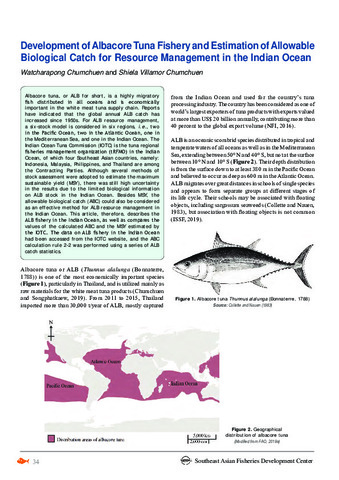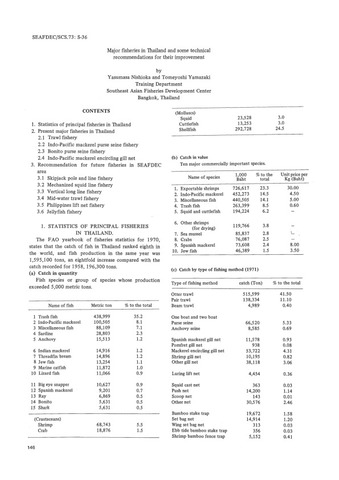Development of albacore tuna fishery and estimation of allowable biological catch for resource management in the Indian Ocean
Share
Abstract
Albacore tuna, or ALB for short, is a highly migratory fish distributed in all oceans and is economically important in the white meat tuna supply chain. Reports have indicated that the global annual ALB catch has increased since 1950s. For ALB resource management, a six-stock model is considered in six regions, i.e., two in the Pacific Ocean, two in the Atlantic Ocean, one in the Mediterranean Sea, and one in the Indian Ocean. The Indian Ocean Tuna Commission (IOTC) is the tuna regional fisheries management organization (tRFMO) in the Indian Ocean, of which four Southeast Asian countries, namely: Indonesia, Malaysia, Philippines, and Thailand are among the Contracting Parties. Although several methods of stock assessment were adopted to estimate the maximum sustainable yield (MSY), there was still high uncertainty in the results due to the limited biological information on ALB stock in the Indian Ocean. Besides MSY, the allowable biological catch (ABC) could also be considered as an effective method for ALB resource management in the Indian Ocean. This article, therefore, describes the ALB fishery in the Indian Ocean, as well as compares the values of the calculated ABC and the MSY estimated by the IOTC. The data on ALB fishery in the Indian Ocean had been accessed from the IOTC website, and the ABC calculation rule 2-2 was performed using a series of ALB catch statistics.
Suggested Citation
Chumchuen, W., & Chumchuen, S. V. (2019). Development of albacore tuna fishery and estimation of allowable biological catch for resource management in the Indian Ocean. Fish for the People , 17(3), 34-40. http://hdl.handle.net/20.500.12066/5795
Subject
Collections
Related items
Showing items related by title, author, creator and subject.
-
The Status of Fisheries in the Republic of Maldives
Faiz, Mohamed (Training Department, Southeast Asian Fisheries Development Center, 1997)The paper discusses the tuna fisheries in Maldives which dominates its fishing industry. Apart from a very strong domestic market, tuna is also the main export commodity of the country. Moreover, reef fisheries such as, ... -
Major fisheries in Thailand and some technical recommendations for their improvement
Nishioka, Yasumasa; Yamazaki, Tomeyoshi (Japan International Cooperation Agency, 1977)Presented in this paper is the development of fisheries industry in Thailand. The data on the production of the principal fisheries species and major fishing methods are also presented. Also included are the recommendations ... -
Status of Fishing Conditions in Cambodia
Sour, Kim; Vuthy, Ros (Training Department, Southeast Asian Fisheries Development Center, 1997)Fisheries in plays a very important role in Cambodia’s national economic development. Total fish catch production in 1996 was 104 310 tones, about which 60% was contributed by inland capture fisheries, 30% by marine capture ...





